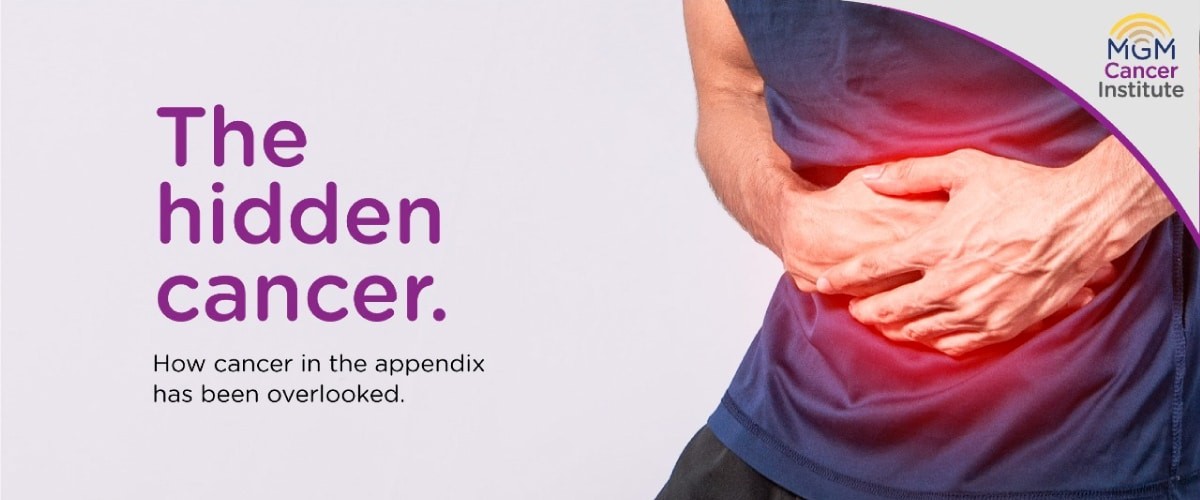
Appendix Cancer: A Tiny Pouch with Big Responsibilities (or) Appendix Cancer: A Rare Menace
The human body is a marvel of complexity, with each part contributing to its overall function in unique and intricate ways. One such lesser-known component is the appendix, a small pouch attached to the large intestine. While long-dismissed as a vestigial structure, recent research has unveiled a potential role for the appendix that extends beyond what meets the eye. Scientists and medical experts are now exploring the possibility that the appendix serves as a reservoir for beneficial gut bacteria, safeguarding these microorganisms from the disruptions caused by intestinal illnesses and excessive antibiotic usage. Amidst this backdrop, the occurrence of appendix cancer, though rare, underscores the importance of this overlooked organ.
Appendix cancer arises when the cells in the appendix undergo mutations and start to grow uncontrollably. Though it can strike at any age, it’s more prevalent in individuals over 50, and women tend to be at a higher risk. The early symptoms of this condition are often subtle and easily confused with other gastrointestinal issues. Bloating, abdominal pain, nausea, vomiting, an increase in waist size, and even fertility problems may all signal the presence of appendix cancer. Thus, being vigilant about any persistent discomfort is crucial, especially if you fall within the high-risk demographic.
Appendix cancer manifests in various forms, each with its distinct characteristics.
It’s Types:
The most common types include:
1. Carcinoid Tumors: These tumors, accounting for approximately half of all appendix cancers, affect neuroendocrine cells responsible for hormone release. In most cases, carcinoid tumors grow slowly, emphasizing the need for regular medical checkups to ensure early detection.
2. Mucinous Cystadenoma: These benign tumors form within the lining of the appendix. As long as the appendix remains intact, these growths are unlikely to spread to other parts of the body, providing a somewhat reassuring perspective for those diagnosed with this type.
3. Appendiceal Adenocarcinoma: Starting in the glandular tissue lining the organs, adenocarcinoma is a more aggressive form of cancer that necessitates proactive treatment strategies.
Unveiling Risk Factors :
Several risk factors have been associated with the development of appendix cancer. Smoking or tobacco product usage, certain medical conditions like pernicious anemia and atrophic gastritis, age, and gender are among the factors that can increase one’s susceptibility to this condition. The risk tends to rise with age, and women seem to be more vulnerable.
Hereditary Myths :
Despite the intricate interplay of genetics in many cancers, current evidence does not suggest a hereditary link to appendix cancer. Ongoing research continues to delve into this area, yet it remains widely accepted that the majority of cases do not result from a genetic predisposition.
Treatment Approaches:
The treatment of appendix cancer requires a tailored approach, considering the type of tumor and its stage. The primary treatment methods include:
1. Surgery
2. Chemotherapy
3. Hyperthermic Intraperitoneal Chemotherapy (HIPEC)
4. Targeted Drug Therapy
The appendix, once dismissed as a mere evolutionary relic, now stands as a potential guardian of our gut health. As we delve deeper into its multifaceted functions, we gain a greater understanding of its role in preserving our overall well-being. With appendix cancer, a rare but significant reminder of the complexity of the human body, early detection, and a multifaceted treatment approach offer hope to those facing this diagnosis. As science continues to unveil the mysteries of our bodies, the appendix remains a testament to the hidden wonders that await discovery within us.
Contact MGM Cancer Institute to learn more.
Visit our website www.mgmcancerinstitute.in or call +91 44 4251 5151.
Date: 20-09-2023
Written by,
Contact Us
Visiting Hours
OPEN 24 hours 7 days a week.
OPD Timings : Monday to Saturday
( 9:00 AM to 5:30 PM )
Appointments
Emergency
Visit the hospital
MGM Healthcare Pvt Ltd
No 119 & 121, Nelson Manickam Road, Raajeswari Street, Rajaram Mehta Nagar,
Aminjikarai, Chennai – 600029
At MGM Cancer Institute, we believe in curing the fear of cancer first. We understand that battling cancer is not just a physical fight, but a mental and emotional one as well. Our dedicated team is committed to providing exceptional healthcare that improves your overall well-being and eases the anxiety that comes with cancer. With a 150-bed facility in the heart of your city, we are here to support you every step of the way.















